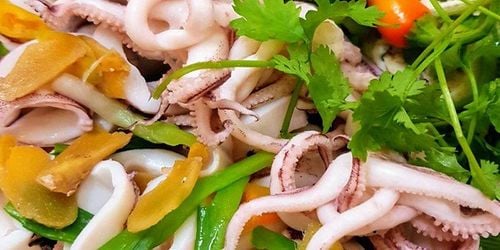This is an automatically translated article.
The article was professionally consulted with Master, Doctor Nguyen Thi Hong On - Obstetrician and Gynecologist - Department of Obstetrics and Gynecology - Vinmec Phu Quoc International General Hospital.Your care during pregnancy begins even while the baby is still in the womb, and so you must make sure to sleep right, read right, walk right and eat right. Calamari is the Italian name for "squid", it has high nutritional value. It is a good source of omega-3 fatty acids, protein and other essential nutrients, and is low in sodium and saturated fat. So can pregnant women eat squid? Can I eat squid when pregnant in the first 3 months or 7 months pregnant? Read the article below to help you better understand this issue.
1. What is Calamari?
Calamari is the Italian way of calling squid (which is the plural of calamaro), in addition, Westerners also use it to refer to squid dishes. Squid is a type of mollusk seafood, related to cuttlefish and octopus. Squid's flesh is firm, white, has a light sweet taste and brings a very attractive aroma to the eaters. Squid is usually a few centimeters to 25 centimeters long. Squid is a favorite seafood because they are suitable for many cooking methods, and they are even eaten raw in sushi dishes.Seafood is a source of food that brings a lot of nutritional value to humans. They are popularly used in almost every country because of their high nutritional value and many ways of preparation. Nutrition in 100g squid includes:
Copper (1.8mg): Helps in the production of hemoglobin, keeping blood vessels, bones and nervous system healthy. Selenium (44mcg): Regulates thyroid hormone and prevents oxidative stress. Protein (15g): Supports the building of tissues in the baby's body and strengthens the immune system. Phosphorus (213mg): Helps strengthen baby's teeth and bones, helps form genetic material, enzymes and cell membranes, releases energy during metabolism. Vitamin B2 (0.389mg): Beneficial for your metabolism. Vitamin B12 (1.05mcg): Helps form red blood cells, genetic material and the central nervous system, helps regulate fat and protein metabolism. Zinc (1.48mg): Plays a role in the production of enzymes and insulin in the fetal body. Vitamin C (3.6mg): Develops the immune system. Iron (0.86 mg): Forms red blood cells and increases hemoglobin levels, increasing blood flow through the uterus. In addition, calamari is not only delicious but also contains nutrients that are beneficial during pregnancy. For example, calamari is a rich source of omega-3s. Omega-3 fatty acids are essential during pregnancy because they promote fetal brain development. In addition, calamari is an excellent source of protein, vitamin E, copper, B12, zinc, selenium and iron, all of which are important nutrients during pregnancy.

2. Can pregnant women eat squid?
Hormonal changes not only affect their mood, but they can also affect what they like to eat. Some pregnant people don't like food, even thinking eating certain foods makes them sick. However, others experience cravings for certain foods.Calamari and other seafood are excellent sources of nutrients and part of a healthy pregnancy diet. Although squid is considered one of the high nutritional value seafood, is a source of fatty acids, omega-3, protein and other essential nutrients. However, most seafood contains some amount of mercury, and squid is on that list.
Many pregnant women have asked the question: “So is it good to eat squid during the first 3 months of pregnancy? Or can someone who is 7 months pregnant eat squid?" or “Is Calamari safe to eat during pregnancy despite the mercury content of foods?”.
In fact, the FDA has measured the average mercury levels of many types of seafood, spanning more than 20 years. Calamari has an average of 0.024 PPM (parts per million) of mercury, which is considered very low (information from the FDA Food and Drug Administration). Therefore, calamari does not have a high mercury content, in fact it is found to be very low in mercury.
Many studies have shown that mercury levels vary depending on the type of seafood, some species contain more mercury than others. According to the Food and Drug Administration (FDA), pregnant women should avoid seafood that contains the highest levels of mercury. Calamari is actually included in one of the best seafood options for women who are pregnant or for those who may become pregnant, also according to the FDA. Calamari contains significantly less mercury than in shark, swordfish, tuna and marlin. Because of calamari's low mercury content, women who are 3 months pregnant or 7 months pregnant can safely consume two to three servings per week of one serving equal to 4 ounces. This is one of the good seafood to choose from during pregnancy because it is low in mercury and high in nutrients that are important for the health of you and your developing baby. However, calamari is safe for pregnant women only when it is fully cooked and when it is fresh (or fresh when frozen). If calamari has been cooked, 3 months pregnant or 7 months pregnant can also be eaten at any stage of pregnancy. Pregnant women should avoid raw or undercooked seafood such as squid, due to the risk of bacterial contamination that affects the digestion of food.
Trắc nghiệm: Chế độ dinh dưỡng 3 tháng đầu thai kỳ của mẹ bầu như thế nào?
3 tháng đầu được coi là giai đoạn phát triển quan trọng nhất của thai nhi. Để phát triển toàn diện, thai nhi cần được cung cấp đầy đủ dưỡng chất, đặc biệt là các vi chất cần thiết. Làm bài trắc nghiệm dưới đây sẽ giúp bạn có thêm kiến thức về chế độ dinh dưỡng trong 3 tháng đầu thai kỳ.The following content is prepared under supervision of Bác sĩ chuyên khoa I, Lê Hồng Liên , Sản phụ khoa , Khoa Sản phụ khoa - Bệnh viện Đa khoa Quốc tế Vinmec Central Park

Thus, calamari is a good source of food for pregnant women during the first 3 months of pregnancy or 7 months of pregnancy who can eat squid. The amount of mercury in calamari is very little and ensuring we cook the food, it provides a very rich source of nutrients such as omega-3, some vitamins,... In addition, pregnant women should also avoid these types of foods. Foods with high mercury content reduce the level of harm to the fetus.
Please follow the website ( www.vinmec.com ) for more information on health care instructions, which we will update regularly.
Please dial HOTLINE for more information or register for an appointment HERE. Download MyVinmec app to make appointments faster and to manage your bookings easily.
Reference source: healthline.com













